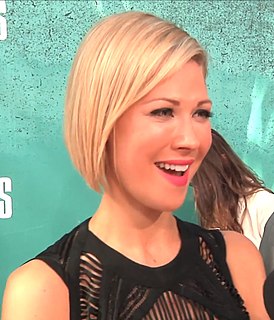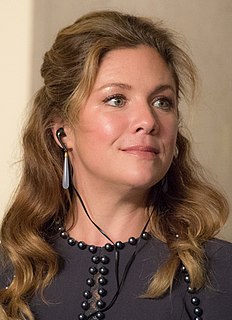A Quote by Desi Lydic
I think there's a misunderstanding that feminism is about bringing men down to bring women up and it's certainly not that.
Related Quotes
As all advocates of feminist politics know most people do not understand sexism or if they do they think it is not a problem. Masses of people think that feminism is always and only about women seeking to be equal to men. And a huge majority of these folks think feminism is anti-male. Their misunderstanding of feminist politics reflects the reality that most folks learn about feminism from patriarchal mass media.
I get very frustrated when I hear women saying, "Oh, feminism is passé," because I think feminism means empowerment. Men can be feminists, too! Many men are feminists. We need feminism. It's not against men; it's about the empowerment of women. It's the respect of women - giving women equal rights, the same opportunities.
On Girls I like being a mouthpiece for the issues I think young females face today. It’s always shocking when people question whether it’s a feminist show. How could a show about women exploring women not be? Feminism isn’t a dirty word. It’s not like we’re a deranged group who think women should take over the planet, raise our young on our own and eliminate men from the picture. Feminism is about women having all the rights that men have.
I think feminism has always been global. I think there's feminism everywhere throughout the world. I think, though, for Western feminism and for American feminism, it not so surprisingly continues to center Western feminism and American feminism. And I think the biggest hurdle American feminists have in terms of taking a more global approach is that too often when you hear American feminists talk about international feminism or women in other countries, it kind of goes along with this condescending point of view like we have to save the women of such-and-such country; we have to help them.
That's what's always been such a curious thing to me about feminism. They never lost any power. However, when you start talking about this particular area of our population, you're talking about the politicized nature of our country where feminism dominates and all heterosexual men want women. And all men realize you've got to do certain things. If you want to get a woman who happens to be a feminist, then you better do and say, be certain things. Men have gone crazy trying to be what they think women want them to be, and that's men in Washington, gone crazy.
I was a young feminist in the '70s. Feminism saved my life. It gave me a life. But I saw how so much of what people were saying was not matching up with what they were doing. For example, we were talking about sister solidarity, and women were putting each other down. We were talking about standing up for our rights, and women weren't leaving abusive relationships with men. There were just so many disconnects.
Feminism as a movement for political and social equity is important, but feminism as an academic clique committed to eccentric doctrines about human nature is not. Eliminating discrimination against women is important, but believing that women and men are born with indistinguishable minds is not. Freedom of choice is important, but ensuring that women make up exactly 50 percent of all professions is not. And eliminating sexual assaults is important, but advancing the theory that rapists are doing their part in a vast male conspiracy is not.
I had a real come-to-Jesus a couple of years ago when I started to see the direct line between feminism and everything else - feminism and climate change, feminism and poverty, feminism and hunger - and it was almost like I was born again and started walking down the street and was like, "Oh, my God, there are women everywhere! They're just everywhere you look. There's women all over the place!"
Naturally my stories are about women - I'm a woman. I don't know what the term is for men who write mostly about men. I'm not always sure what is meant by "feminist." In the beginning I used to say, well, of course I'm a feminist. But if it means that I follow a kind of feminist theory, or know anything about it, then I'm not. I think I'm a feminist as far as thinking that the experience of women is important. That is really the basis of feminism.
My feminism has evolved way beyond self-empowerment and I see feminism as a path to peace on earth. The fundamental imbalance that is behind all of the other social diseases is patriarchy. I do believe. As men and women, together, I really long to feel my society evolve its understanding since we're one of the leaders in the f-word. I want us to grow our idea of feminism collectively and get both men and women involved in undoing patriarchy. It's huge. It's a huge job.
































